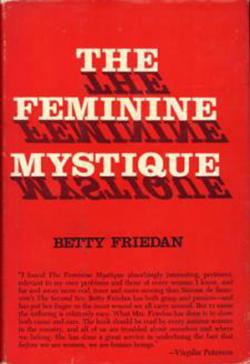Noreen, you may be ungrateful, but you are not a brat—more like Mary McCarthy winging her way back to life. Watch out. You’ve cast me in the role of middle-aged second-wave loyalist, to which I say: But I love to knit!
Which proves exactly nothing. Betty never said women couldn’t knit. She just didn’t want us to feel like we had to find our life’s meaning in sock production. It’s all about proportion, isn’t it? That’s why you see visions of Park Slope excess when she writes about breast-feeding but also why I think you’re wrong that it’s any kind of betrayal of her brand of feminism to check Pinterest during conference calls. The first is obsessive; the second is diversionary.
Let’s not turn Betty into some kind of fun-killing witch. She was critical of the study of “the theory and preparation of a Basque paella, of a well-marinated shish kebob” for example, because the person who was pushing for women to bend their minds to the subject was the female president of the women’s school Mills College, who also wrote, “Would it be impossible to present a beginning course in foods as exciting and as difficult … as a course in post-Kantian philosophy would be?” Basically: Don’t forget the context, my dear. I like the softer version of feminism too—who doesn’t prefer any -ism without the hard edges? But I think we both feel that way because we live in a time when you actually can take your laptop to the labor and delivery room. (Though I vote against that one, just for the record.)
While Betty clearly found herself in her work, and valorizes labor, I was struck by how broadly she defines the term. She’s all for volunteering as long as it has some drive behind it. What bothers her is “meaningless busywork” and PTA chapters with presidents who are men. (Was that a real thing?) She wants women to lead the PTA and then run for school board, not necessarily turn into corporate lawyers. That’s a key distinction, don’t you think? In the addition to the book she wrote in 1997, she says, “All those years when women did the PTAs, and Scouts, and church and sodalities and Ladies Village Improvement Society for free, no one valued them much at all. Now that women take themselves seriously, and get paid and taken seriously, such community work, in its absence … is now being taken seriously too.” That may be a little optimistic, but it’s not divisive or narrow-minded. And you’re right that Betty’s vision of work is more elastic and forgiving than Sheryl Sandberg’s “Don’t leave until you leave.” Ambitious, go-getter friends of mine who have read Sandberg’s new book, Lean In, say it very much speaks to them. I wonder, though, whether it’s catnip for future women leaders but a lot less appetizing for women who put their kids before work even as they care about both.
Speaking of kids, you asked what I made of Betty’s glancing attention to them. You’re right—she’s not worked up about this subject. She tells us in the epilogue that after the book was published and she started “acting like a real writer,” her kids were kicked out of the car pool for art and dancing lessons because “the other mothers had a fit when I now called a cab when it was my turn, instead of driving the children myself.” I swear up and down that I have never called a cab to pick up my children. But that’s because they have a baby-sitter three days a week after school, and on Fridays—the day I am supposed to pick them up—my husband actually does it at least half the time. Child care has definitely replaced housework as the focus of stay-at-home parenting, and that’s a good thing, because it’s so much more important and worthwhile. But I am all for Betty’s emphasis on self-reliance, which plenty of kids today, including mine I’m sure, don’t get enough practice developing. This part of the book does feel relevant to me, as much as for the sake of the kids as for their mothers.
Also, can I say without minimizing Betty’s own challenges as a person, that her three children, my cousins, all turned out more than fine? Don’t you think there’s room for that truth and for the value of all the hours your mom logged with you? You better hope so, because otherwise I’m coming either for your laptop or your future kids.
